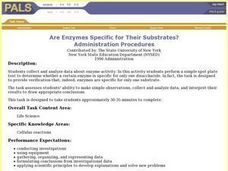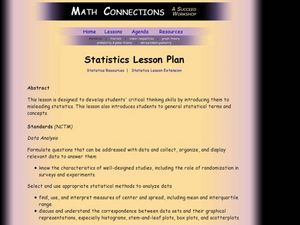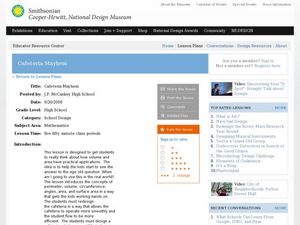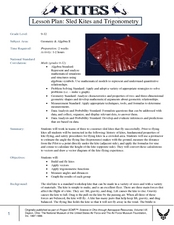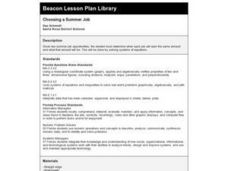Curated OER
Problem-Solving Application: Use a Graph
In this problem solving learning exercise, 6th graders use the problem solving steps of understand, plan, solve and look back to answer a graphing question.
Curated OER
Famous Rock Groups
Students define igneous, metamorphic, and sedimentary, and use rock identification books to identify igneous, metamorphic, and sedimentary rocks. Students then discuss which rocks early man would have found useful for tool creation.
Curated OER
Some of Its Parts
Students study a can opener to find the important parts that make it possible to take the lid off a can of food. They then use this information to decide what new or different subsystems could be added to make it better and explain how...
Curated OER
Are Enzymes Specific for Their Substrates?
Pupils discover enzyme to substrate specificity. The experiment uses samples of glucose and lactose in combination with the enzyme lactase. Students observe the reaction between the lactose and the lactase; the lack of a reaction...
Curated OER
Playing With Probability
Students rotate through work stations where they compute problems of theoretical and experimental probability. In this probability lesson plan, students use simulations of a lottery system.
Curated OER
Onion Skins
Students explore the structure of a plant cell. They carefully peel a single layer of onion skin from a slice of onion and stain it with methylene blue to observe the structures inside. They use a Digiscope connected to a computer to...
Curated OER
Statistics: Misleading or Accurate?
Students explore the concept of misleading statistics. In this misleading statistics lesson, students play a game of tag and graph the number of times each student gets tagged. Students use the graph to determine the fastest runner in...
Curated OER
Pythagorean Theorem: Triangles and Their Sides
Students investigate triangles and their relationship to each other. In this geometry lesson, students solve right triangles using the properties of the Pythagorean Theorem. They differentiate between right, acute, straight and oblique...
Curated OER
Leap Into Exponential Functions
Studens identify the properties of exponents. In this algebra lesson, students grapha nd solve equaitons of exponential functions. They add, subtract, multiply and divide using exponents.
Curated OER
Leap Into Exponential Functions
Students use properties of exponents to solve equations. In this algebra lesson, students add, subtract, multiply and divide exponential functions. They graph and differentiate between exponential growth and decay.
Curated OER
More Lizard Snacks
Students listen to Chapter I, Chapter II, Chapter III, and Chapter IV of "The Forgetful Pony". They observe different stages of development of mealworms. The student sequences pictures to show the life cycle and draws the developmental...
Curated OER
Fire!, Probability, and Chaos
Students explore the concept of probability. In this probability lesson, students simulate a controlled forest burn using an applet. Students vary the probability of trees burning and predict what will happen.
Curated OER
Probability and Sports
Pupils explore the concept of probability in sports. In this probability in sports lesson, students research a sport that they enjoy. Pupils find probability information related to their sport. Students share their findings with the class.
Curated OER
Magnetism and the Magnetic Force
Fourth graders investigate magnetism and the magnetic force.
Curated OER
The Museum Idea
Students discover the nature and uses of museums by completing several creative projects. Students also analyze abstract art with teacher guidance.
Curated OER
Architectural Change
Students investigate the various types of architecture used in Los Angeles. They conduct Internet research, analyze the sequence of architectural development in the Los Angeles region, and create a presentation on a specific...
Curated OER
Magnifiers
Students describe how several different objects magnify a provided sentence and decide if they are good magnifiers or not. They then write a sentence describing two properties an object must have in order to be a good magnifier.
Curated OER
Hydrated Salt
Students plan, design, and carry out an experiment to determine an empirical formula for a hydrated salt X that tell students when all the water has been removed from hydrate crystals.
Curated OER
Cafeteria Mayhem
Students design a cafeteria floor plan. In this area and perimeter activity, groups create an efficient lunchroom layout on poster board by using geometric shapes and formulas as the basis for their designs. In the accompanying writing...
Curated OER
Sled Kites and Trigonometry
Students study the history of kites and their fundamental properties. In this kites lesson students divide into teams and build and fly kites.
Curated OER
Slopey Math
Students identify the slope of a line and use it to solve real life problems. In this algebra lesson, students write linear equations in slope intercept form and make a correlation to its relation to the real world. They use the slope an...
Curated OER
Risky Business
Students view a video on AIDS, HIV and the ways in which HIV is spread. They discuss ways to avoid contracting HIV and participate in a simulation that shows the growth of a communicable disease.
Curated OER
What Structures and Behaviours Can Be Observed in Vinegar Eels?
Students view vinegar eels under a microscope at different magnifications. They use a DigiScope with the camera attachment in place of the eyepiece. Students count the number of thrashing movements in 10 seconds. They repeat this three...
Curated OER
Choosing a Summer Job
What did you do over your summer vacation. Young wage earners must compare summer job options, and determine when each job earn the same amount and what that amount be. This be done by creating, graphing, and solving systems of...





